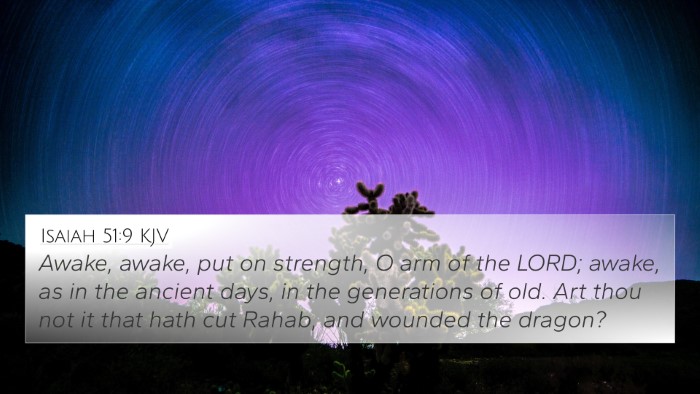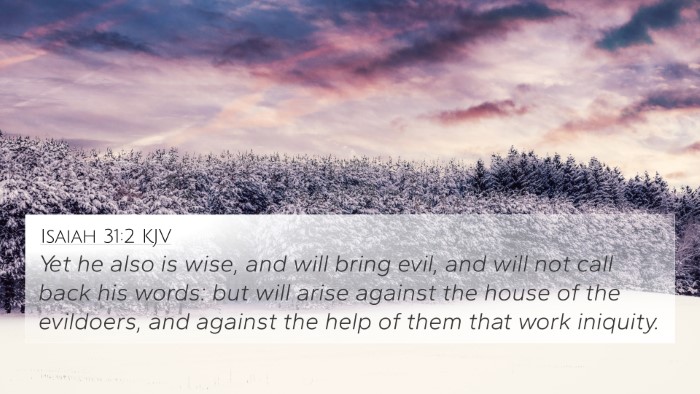Understanding Job 9:13
Job 9:13 reads, "If God does not withdraw his anger, the proud helpers do stoop under him." This verse highlights the profound nature of divine sovereignty and the frailty of human strength when faced with God's judgments. Below is a summary of insights gathered from the public domain commentaries by Matthew Henry, Albert Barnes, and Adam Clarke, which reflects on the theme presented in this verse.
Verse Meaning and Context
The book of Job is a profound exploration of human suffering, divine justice, and the enigmatic nature of God's will. In Job 9:13, Job acknowledges the futility of man in contrasting God’s omnipotence. Here are the primary interpretations of this verse:
-
Matthew Henry's Commentary:
Matthew Henry emphasizes the absolute power of God, indicating that even the most prideful and strong may be rendered helpless before Him. Job perceives God’s anger as a force that even the proud must submit to. Henry's interpretation encourages the reader to recognize the divine authority that governs all things.
-
Albert Barnes' Notes:
Barnes notes that Job expresses a sense of despair over the inability to defend himself against divine judgment. He implies that if even those who are strong and proud fall under God's authority, how can one stand in such a mighty presence? This lends to the theme of humility necessary in our relationship with God.
-
Adam Clarke's Commentary:
Clarke adds depth by discussing the notion of 'helpers,' which refers to those who might assist the proud. He suggests this highlights a universal truth: that human alliances and strengths will eventually falter before divine action. Clarke encourages reliance on God rather than on human capabilities.
Thematic Connections
Job 9:13 can be further understood through thematic inter-Biblical connections. Here are several related scripture cross-references:
- James 4:10: "Humble yourselves before the Lord, and he will lift you up." (This reflects the theme of humility before God.)
- Psalms 18:27: “For you save a humble people, but the haughty eyes you bring down.” (Emphasizing God’s stance against pride.)
- Isaiah 2:12: “For the LORD of hosts has a day against all that is proud and lofty.” (The certainty of God's judgment on arrogance.)
- Romans 14:10: "For we will all stand before God’s judgment seat." (Acknowledging that all must answer to God.)
- Proverbs 16:5: “Everyone who is arrogant in heart is an abomination to the LORD; be assured, he will not go unpunished.” (The inevitability of divine justice.)
- Job 15:25-26: “For he has stretched out his hand against God, and defies the Almighty.” (A reference to the arrogance of man in the face of God.)
- Psalms 75:5-7: “Do not lift up your horn on high... For not from the east or from the west and not from the wilderness comes lifting up, but it is God who executes judgment.” (Resonating the futility of relying on human strength.)
Importance of Cross-Referencing
The understanding of Job 9:13 can greatly benefit from scriptural cross-referencing. Utilizing a bible concordance allows readers to explore connections between different verses, revealing a richer tapestry of meaning. Here are some suggested ways to enhance your study through bible cross-reference guides:
- Use a bible reference resource to look up related themes such as humility, judgment, and divine authority.
- Engage in cross-referencing Bible study methods to connect Job’s lamentation with the New Testament insights on humility.
- Explore comparative studies of Pauline epistles where the nature of human weakness is discussed in light of God’s strength.
- Consider cross-referenced themes in the Bible that discuss the tension between human pride and divine majesty.
Concluding Thoughts
Job 9:13 serves as a poignant reminder of the supremacy of God over all creation and the ultimate vulnerability of humanity in the face of divine judgment. Through careful cross-referencing and thematic analysis, we glean deeper insight into the biblical principles of humility, reliance on God, and the nature of divine justice. As you study, consider the comprehensive Bible cross-reference materials available to further deepen your understanding and enrich your spiritual journey.
Final Thoughts
In exploring Job 9:13, we are called not only to recognize God's power but to submit to His will. The reflections from these public domain commentaries guide us in contextualizing this ancient wisdom in our contemporary lives.









